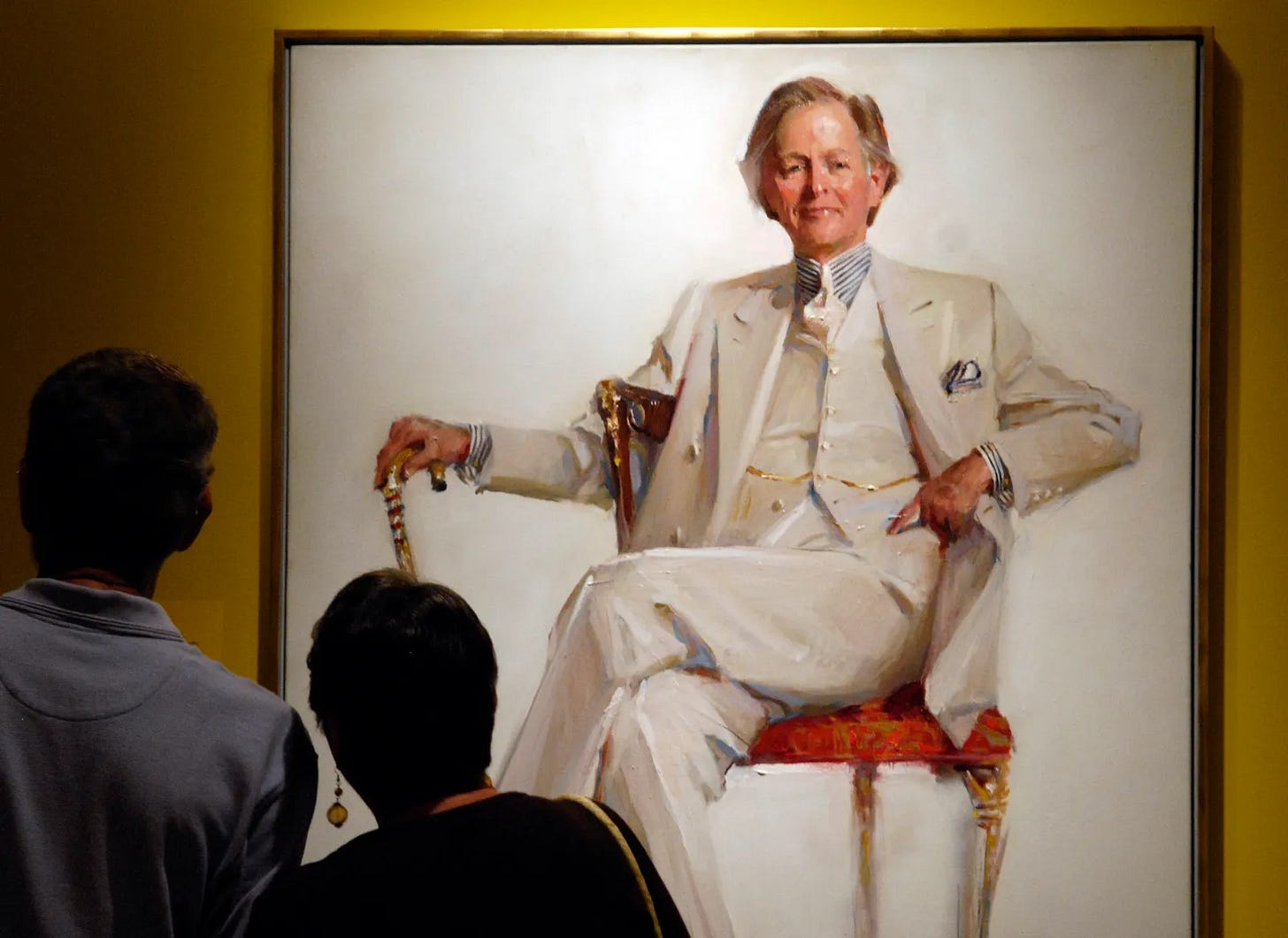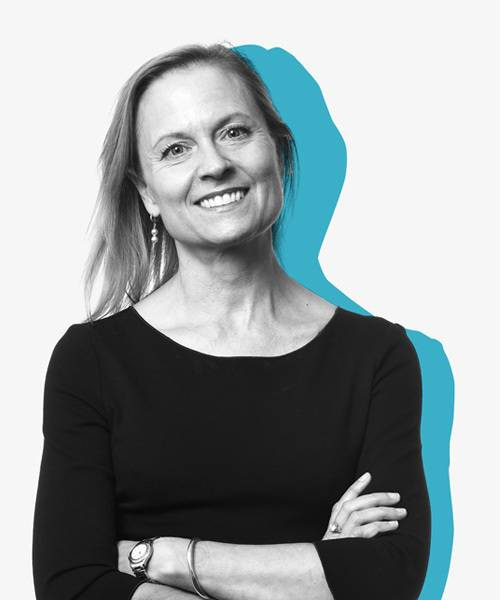The Case for a Civic Counterculture
Johns Hopkins University's Dr. Ashley Rogers Berner on restoring the art of "knowledge-building".
No one expected a 3-piece white suit when Tom Wolfe wrote The Electric Acid Kool-Aid Test, becoming the authoritative literary voice of 1960s counterculture.
I didn’t know what to expect when I started reaching out to civic scholars whose life work has been so different from mine. I worried my questions would sound silly or my ignorance would be exposed. So far, all my worries are unfounded. I’ve met warm, dynamic, purpose-driven people who make me feel like I could chat with them all day long.
It’s hard to find anyone who disagrees that “civics” needs a good PR strategy. From my small corner of the world, I’ve spent the last few months putting together a list of “civic influencers” to validate my belief that, despite all the divisiveness, there are smart and inspiring people doing really important work — and even creating something of a civic counterculture.
At some point in my search for these “civic influencers”, I realized I was working off of two separate lists that needed to be combined. Dr. Ashley Rogers Berner was on both lists. She represents a new vanguard of leading civic voices taking their expansive body of work on the metaphorical road, breaking down things typically reserved for academic minds and changing the way people think about civics.
Because there is so much I want to know, Dr. Berner graciously agreed to contribute a 3-part series to Civic EQ. For this initial post, I asked Dr. Berner to lay the groundwork by explaining how parents and kids can start building a robust civics knowledge base. There are also helpful links included below for anyone who wants further reading.
Dr. Ashley Rogers Berner on the Building Blocks of Civic Knowledge
There’s a lot parents can do to build children’s civic capacities, but the task can feel overwhelming. For one thing, we often doubt our own civic knowledge. For another, we wonder where to start.
Helpfully, political scientists break down civic preparation into four key indicators: political knowledge, political skills, the habit of civic involvement, and the art of civil tolerance. Let’s focus here on political knowledge, or the specific content that democratic citizens should have at the ready.
What should 18-year-olds know about the world to be effective citizens?
A lot, it turns out. Because the ideal is to understand not only how the U.S. government works, but also how monarchies function; not only how NATO was formed, but also how the Roman Republic was born and died; not only where one’s home state is, but what the capitols of countries in South America and Europe are, and why they matter. “Political knowledge” includes understanding what human beings have believed (comparative religion and ethics), what they have created (how have the fine arts changed over time?), and how geography connects to world events. The liberal arts approach is actually the best way to build political knowledge that counts.
If this sounds counter-cultural to the world of “21st-century skills,” and “learning how to learn,” it is. But research is on the side of the liberal arts. A few data points illustrate why.
First, knowledge is “sticky,” and “the more you know, the easier it is to learn more.” That’s how psychologist Daniel Willingham at the University of Virginia puts it. His ground-breaking research demonstrates the role that background knowledge plays in academic success. We can’t Google our way out of ignorance; we have to connect the dots in the moment, based on prior knowledge. A terrific book that sets out this research is Natalie Wexler’s The Knowledge Gap (2019).
Second, knowledge is specific and concrete, and higher-performing countries require kids to demonstrate mastery of coherent bodies of knowledge. By contrast, a hundred years ago, the United States’ educational establishment opted for skills and process over content mastery. Our current classrooms and tests are content-agnostic – but when school systems require content mastery, student success accelerates and achievement gaps close. E.D. Hirsch’s Why Knowledge Matters (2016) is a great read on this.
Third, shared knowledge creates social cohesion. Unlike the U.S., which sees education in a binary “public” versus “private,” most countries fund all different kinds of schools on equal footing. The Netherlands supports 36 different kinds of schools, from Catholic to Jewish to Socialist. Belgium, the UK, Poland, and Switzerland do, too. The Australian federal government is the number one funder of low-income kids’ access to independent schools in the country. And Alberta, Canada, gives stipends to homeschoolers and supports Inuit schools alongside of secular, Protestant, and Montessori ones. How do pluralistic systems foster civic attachment given such diversity? By insisting on common content that all schools teach and all students master. This is educational pluralism, and it is the norm among democracies around the world.
Unfortunately, U.S. schools provide such opportunities unevenly. Despite the generally low bar in U.S. schools, however, parents can build their children’s political content knowledge – and their own – one day at a time. Resources abound, but here are three inexpensive, high-impact ideas.
Make great use of globes and maps. Children as young as 3 and 4 can identify the brightly colored shapes on a globe as specific places – and this knowledge can be reinforced by illustrated books about different countries. Older children can play a home-grown version of Concentration by matching states and capitols. You can craft weekend projects around a specific country, letting family members’ individual interests (Art? Architecture? Military expeditions? Sports?) shape the conversation.
Don’t be afraid of memorization. The educational establishment in the U.S. has been allergic to learning by heart for a hundred years, but this is not true of other countries. I wrote my doctorate in the UK, and my children attended English elementary schools. Poetry-reciting contests were a highlight of the year, even in first and second grades! So, too, were learning political ditties (“Remember, Remember, the Fifth of November” – a macabre stanza about Guy Fawkes’ failed attempt to blow up the House of Lords in 1605) and whimsical lists of the kings and queens of Britain. Children take real pride in their memory accomplishments – and reciting out loud can help shyer ones gain confidence. Grandparents or close friends can be a safe audience, in person or via Zoom.
Learn together. Before we moved back to the States, my girls and I decided to memorize the first two paragraphs of the Declaration of Independence – an important reference point which we haven’t forgotten. Let them see you try, fail, and try again. And when the news cycle turns to catastrophe (war, weather) or shared benefit (the Olympics), take the time together to locate key actors on the map; let them see your own curiosity in the face of something new. Or invite a friend who grew up elsewhere to show you all how to make a traditional meal.
These small steps add up over time and will go a long way to supporting the next generation of citizens.
Dr. Berner is Director of the Johns Hopkins Institute for Education Policy and Associate Professor of Education. Before that, she held posts at the University of Virginia and the CUNY Institute for Education Policy. She earned her Masters and PhD from Oxford University. Her first book, Pluralism and American Public Education: No One Way to School was published in 2017, and her next book, Educational Pluralism and American Democracy: How to Handle Indoctrination, Promote Exposure, and Rebuild America’s Schools, comes out in April 2024.



